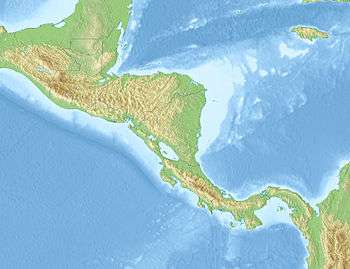1621 Panama earthquake
 Ruins of the Convento de la Concepción | |
 | |
| Local date | May 2, 1621 |
|---|---|
| Local time | ~16:30 (UTC-5) |
| Magnitude | 6.9 M |
| Epicenter | 8°36′N 79°18′W / 8.6°N 79.3°WCoordinates: 8°36′N 79°18′W / 8.6°N 79.3°W [1] |
| Total damage | Moderate [1] |
| Max. intensity | VII (Very strong) |
The 1621 Panama earthquake, also known as the Panamá Viejo earthquake occurred between 16:30 and 16:45 (UTC−5) on 2 May. It is considered to be the first documented violent quake in the Isthmus of Panama, with the epicenter at Pedro Miguel fault, with a magnitude of about 6.9 M and a maximum Mercalli intensity of VII (Very strong). The quake shook and partially destroyed the ancient city of Panama (Panama la Vieja), which at that time was a town of about 5,000 inhabitants. It left extensive damage, especially with buildings made of masonry which were partially or fully destroyed.[2]
Among the buildings that suffered total collapse were the council, municipal, barracks and prison buildings, and the house of the judge of the Audiencia of Panama. The Convento de la Concepción and the Church of the Society of Jesus also suffered considerable damage, but were only partially rebuilt.[3] The earthquake was preceded by a minor earthquake, which occurred between 9 and 10 am, and a small tsunami was reported by a witness, which flooded a street bordering the coast of Panama city.
See also
References
- 1 2 National Geophysical Data Center / World Data Service (NGDC/WDS), Significant Earthquake Database, National Geophysical Data Center, NOAA, doi:10.7289/V5TD9V7K
- ↑ Boletín de vulcanología (in Spanish). La Escuela. 1994. pp. 10–15.
- ↑ Calvo, Alfredo Castillero (2004). Historia general de Panamá. Comité Nacional del Centenario de la República. p. 318. ISBN 978-9962-02-582-5.
Sources
- Gath, E. M.; Rockwell, T. K. (2009). Coseismic offset of the Camino De Cruces confirms the Pegro Miguel Fault as the cause of the AD 1621 Panamá Viejo earthquake (PDF). 1st INQUA-IGCP-567 International Workshop on Earthquake Archaeology and Palaeoseismology. Baelo Claudia, Spain.